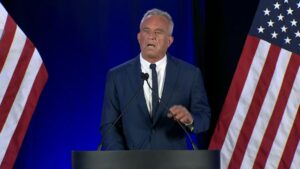‘A Watershed Moment’: CA Senate Passes Historic Bill to Empower Fast Food Workers
In the face of fierce corporate opposition, the California Senate on Monday passed a landmark bill aimed at giving the state’s roughly 550,000 fast food workers a say over their working conditions, hours, and wages in an industry rife with abuse.
If Democratic Gov. Gavin Newsom signs it into law, the Fast Food Recovery Act (AB 257) would make California the first state in the U.S. to establish a council tasked with setting industrywide workplace standards for the fast food sector. The 10-member council would include workers and worker advocates as well as business representatives and state officials.
Newsom has not said whether he will sign the bill, but his Department of Finance argued against the legislation in a recent analysis, claiming it “could lead to a fragmented regulatory and legal environment for employers and raise long-term costs across industries.”
Union leaders strongly disagree with that assessment. Mary Kay Henry, international president of the Service Employees International Union (SEIU), said the measure “will be the most important piece of labor law to pass in decades” if it’s enacted.
“It will give 550,000 fast food workers a chance to sit down with government and their employers to decide wages and working conditions,” said Henry. “I cannot overstate how significant this is. It sets the standard for what states and cities around the country should be doing to support workers.”
The bill, a product of relentless grassroots organizing by workers across the state, has predictably encountered massive, coordinated opposition from the fast food industry and the state’s restaurant sector more broadly.
As the Los Angeles Times reported, corporate lobbying succeeded in weakening some aspects of the historic legislation:
One major change was the removal of a joint liability clause that would have made a corporate franchiser responsible for labor law violations of its franchisees, a provision that opponents of the measure argued would greatly discourage franchising in the state.
Another reduces the size of the governing council and the number of seats allocated to state regulators, originally seven of 13 spots. The revised 10-person council includes four seats held by fast-food franchiser and franchisee representatives and four seats held by fast-food worker representatives and advocates…
The bill establishes that legislators will have sufficient time to review and potentially block any standards set by the council, and the council has a sunset in six years, allowing legislators to evaluate its effectiveness.
The new version of the bill also limits the minimum wage from rising above $22 an hour in 2023.
Besides, recent studies and survey data help explain why worker advocates and unions are focusing their attention on California’s huge fast food industry.
An analysis published in January by UCLA and the University of California, Berkeley found that nearly two-thirds of fast food workers in Los Angeles County have experienced wage theft.
Originally published at Commondreams.org.











